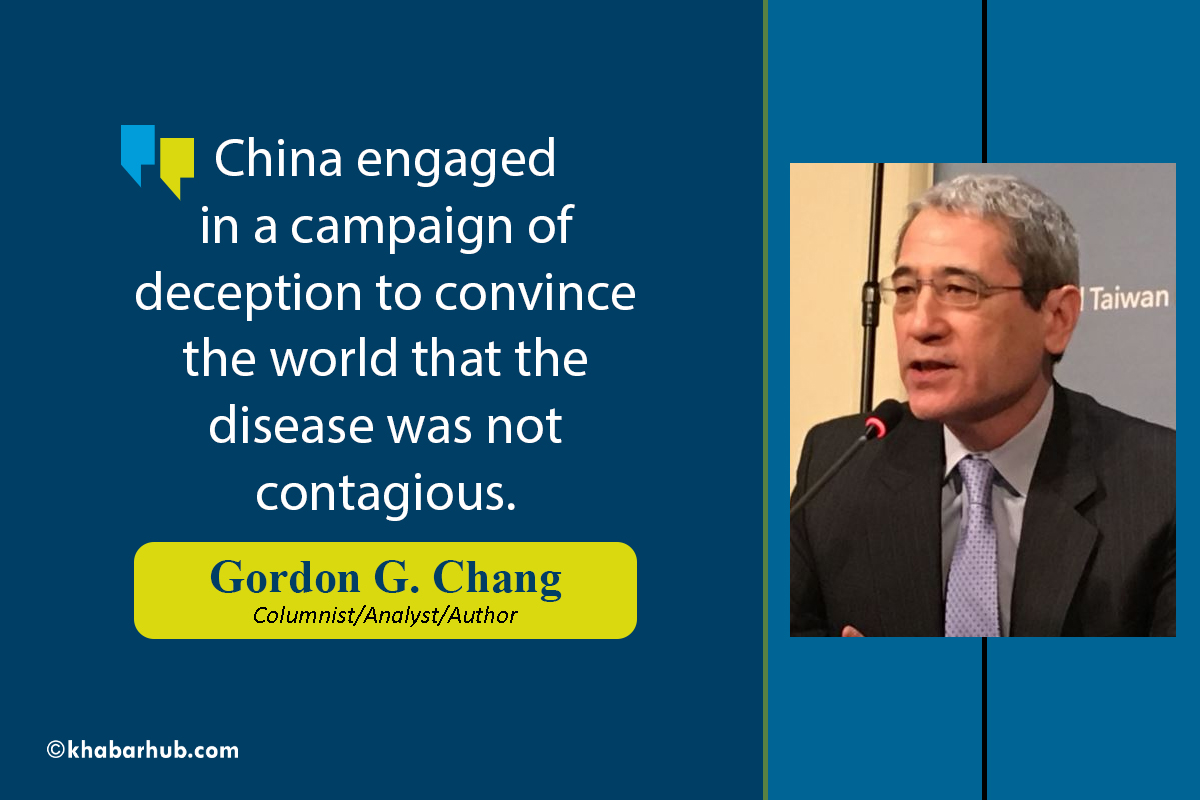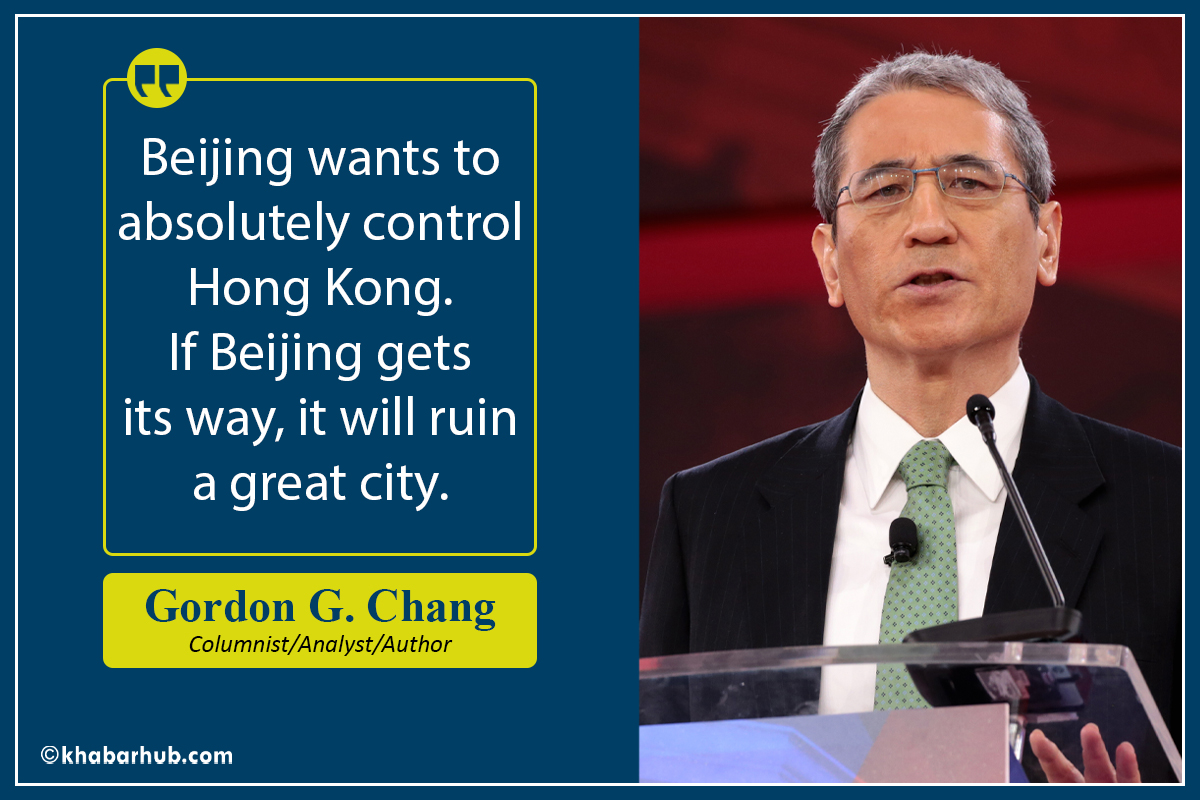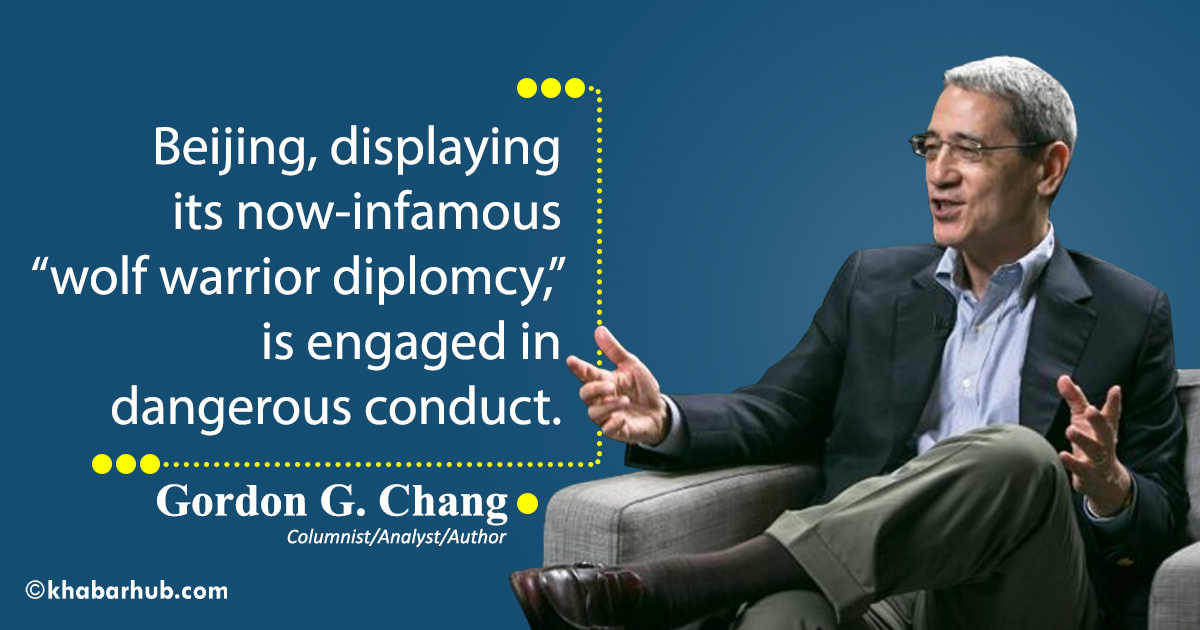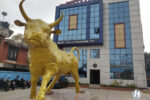Gordon G. Chang, a US expert, is also an analyst, a renowned columnist and the author of “The Coming Collapse of China”. He is best known for this book, which he wrote in 2001. He believes that the United States needs to reassess its relationship with Beijing, which he claims has allowed the deadly coronavirus to spread globally.
He is a widely recognized television pundit and regularly appears in top U.S. television stations as a China expert. He has also authored other books such as ‘The Great U.S.-China Tech War’ & ‘Nuclear Showdown: North Korea Takes On the World’.
In the book The Coming Collapse of China, Chang predicts the continued pressure on China’s currency.
Khabarhub interviewed Chang on various issues, including the situation aftermath of the COVID-19 crisis in Asia (Indo-Pacific) economically, politically and militarily. Excerpts:
What is your assessment on the global order in the Indo-Pacific? Do you see a peaceful and prosperous Indo-Pacific?
The Indo-Pacific is the most volatile region on earth. China’s eastern and southern borders are a ring of fire. Beijing, displaying its now-infamous “wolf warrior diplomacy,” is engaged in dangerous conduct.
Chinese ruler Xi Jinping in recent months has been threatening to invade Taiwan, provoking six countries in China’s peripheral waters, laying the basis for making a territorial claim to all of Kazakhstan, and moving fast to end Hong Kong’s promised autonomy.
Chinese troops are now occupying Indian soil in multiple locations after a series of large incursions beginning early May.
The confrontation, as we now know, turned deadly. And it’s not just his neighbors Xi’s going after. He’s upped the tempo of dangerous intercepts of the U.S. Navy in the global commons.
No wonder the U.S. has three carrier strike groups in the Pacific at the moment. This concentration of assets is unusual but absolutely necessary.
How do you see the United States and Chinese approach in this region?
The goal is not to “ease tensions” as so many put it. The goal is to deter Beijing.

What according to you will be the situation aftermath of the COVID-19 crisis in Asia (Indo-Pacific) economically, politically and militarily?
COVID-19 has stricken societies around the world. I think this disease will mark the end of China’s “rise.” The Chinese economy is contracting, and an export-dependent country no longer controls its own fate.
Will like-minded democratic countries led by the US play a role for a potential change the region’s political, economic and security landscape?
Across the region, countries, both democratic and not, are banding together because they realize they have a common interest in deterring Beijing.
Do you see any probability of negotiation with China that can solve the current confusions?
Negotiations did not stop the Third Reich. They will not stop the People’s Republic.
Do you have any reason to blame China and the WHO for the global spread of coronavirus?
Beijing admitted that the novel coronavirus, the pathogen causing COVID-19, could be transmitted from one human to another only on January 20.
Yet doctors in Wuhan knew—or should have known—by the second week of December that human-to-human transmissions were occurring.
So Beijing knew a few days later. If Chinese officials had said nothing during that five or so weeks, that would have been grossly irresponsible.
But they engaged in a campaign of deception to convince the world that the disease was not contagious.
To make matters worse, Xi Jinping pressured countries to not impose travel restrictions on arrivals from China. Those arrivals turned an epidemic in China into a global pandemic.
We do not know what Xi was thinking, but, having seen how the coronavirus crippled his own society, if he wanted to cripple other societies with coronavirus to level the playing field he would have done what he in fact did.
How will the post-Covid-19 ‘Economic Turbulence’ have an impact on the West and China’s trade and relationship?
Countries like the U.S. are already white-hot angry with China. This makes all relationships, trade, and otherwise, tense.
In your opinion, interviews and tweets, you have mentioned hard line approach toward China. Do you believe that the US needs to intensify pressure campaign against China?
I believe that co-existence with communist China is not possible. We need to up the pressure so that communism fails there.
Is there any possibility of sanctions against China like the ones on North Korea or Iran to cut-off ties?
Anything is now possible. China has now killed more than 125,000 Americans.

Do you see that trade wars, political or economic pressure, or trade embargo would be effective with China in the inter-connected world?
China has an export-dependent economy. No trade, no Chinese regime. So, yes, trade restrictions, if rigorous enough, can be effective.
How do you see China’s decision to impose a national security law on Hong Kong?
Beijing wants to absolutely control Hong Kong. If Beijing gets its way, it will ruin a great city. Hong Kong can be either a global financial center or subject to totalitarian political controls, but not both.
Talking a bit outside the topic, what is your observation on the Korean Peace Process?
North Korea is inherently a hostile state, and there will be no peace in North Asia as long as it exists.
Do you think Kim Jong-un will stick to his commitment of denuclearization?
Kim Jong Un will stick with his denuclearization pledge if the United States enforces sanctions so vigorously that he realizes he cannot keep both power and his arsenal. If the U.S. does not force him to make that choice, he will keep his weapons.









Comment